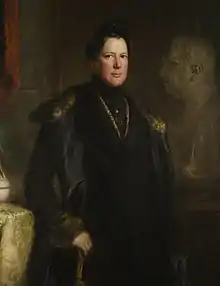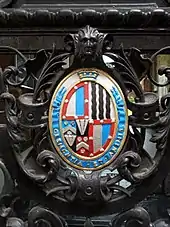Fox Maule-Ramsay, 11th Earl of Dalhousie
Fox Maule-Ramsay, 11th Earl of Dalhousie, KT, GCB, PC (22 April 1801 – 6 July 1874), known as Fox Maule before 1852, as The Lord Panmure between 1852 and 1860, was a British politician.
The Earl of Dalhousie | |
|---|---|
 | |
| Secretary of State for War | |
| In office 8 February 1855 – 21 February 1858 | |
| Monarch | Queen Victoria |
| Prime Minister | The Viscount Palmerston |
| Preceded by | The Duke of Newcastle |
| Succeeded by | Jonathan Peel |
| Personal details | |
| Born | 22 April 1801 |
| Died | 6 July 1874 (aged 73) |
| Nationality | British |
| Political party | Whig Liberal |
| Spouse(s) | Hon. Montague Abercromby
(m. 1807; died 1853) |
Background
Dalhousie was the eldest son of William Maule, 1st Baron Panmure, and a grandson of George Ramsay, 8th Earl of Dalhousie. Christened Fox as a compliment to Charles James Fox, the great Whig, he served for a term in the Army.[1]
Political career

In 1835 he entered the House of Commons as member for Perthshire. In the ministry of Lord Melbourne (1835–1841), Maule was Under-Secretary of State for the Home Department, and under Lord John Russell, he was Secretary at War from July 1846 to January 1852, when for two or three weeks he was President of the Board of Control.[1]
In April 1852, he succeeded his father as 2nd Baron Panmure. In February 1855, he joined Lord Palmerston's cabinet, filling the new office of Secretary of State for War. Lord Panmure held this office until February 1858. He was at the War Office during the concluding period of the Crimean War, and met a good deal of criticism.[1] He was Keeper of the Privy Seal of Scotland from 1853 until his death.
Always interested in church matters, Dalhousie was a prominent supporter of the Free Church of Scotland after it split from the Church of Scotland in the disruption of 1843. In December 1860, he succeeded his kinsman, the 1st Marquess of Dalhousie, as 11th Earl of Dalhousie.[1] He shortly afterwards changed his surname to "Maule-Ramsay" (his father had changed his surname to "Maule" from the family's patronymic "Ramsay" before being created Baron Panmure).[2]
Freemasonry
Maule was appointed Senior Grand Warden of the United Grand Lodge of England in 1832, and later (as Lord Panmure) Deputy Grand Master in 1857.[3] He was elected Grand Master of the Grand Lodge of Scotland in 1867.[3] In 1860, Panmure Lodge (now No. 723) was warranted, being named after the then Deputy Grand Master.[3]
Marriage
Lord Dalhousie married the Hon. Montague, daughter of George Abercromby, 2nd Baron Abercromby, in 1831. They had no children. She died in November 1853, aged 46. Lord Dalhousie died July 1874, aged 73. On his death, the barony of Panmure became extinct, but the earldom of Dalhousie (and its subsidiary titles) passed to his cousin, George Ramsay.[1]
References
- Chisholm, Hugh, ed. (1911). . Encyclopædia Britannica. 7 (11th ed.). Cambridge University Press. p. 767. This cites G. Douglas and G. D. Ramsay (editors), Panmure Papers, 1908. These numerous letters from Panmure's correspondence throw much light on the concluding stage of the Crimean War.
- Sweetman, John. "Maule, Fox [afterwards Fox Maule-Ramsay], second Baron Panmure and eleventh earl of Dalhousie (1801-1874), army officer and politician". Oxford Dictionary of National Biography (online ed.). Oxford University Press. doi:10.1093/ref:odnb/18365. (Subscription or UK public library membership required.)
- "About Us". Panmure Lodge No. 723. n.d. Retrieved 16 July 2019.
External links
- Hansard 1803–2005: contributions in Parliament by the Earl of Dalhousie
- Walford, Edward (1894). . Dictionary of National Biography. 37.